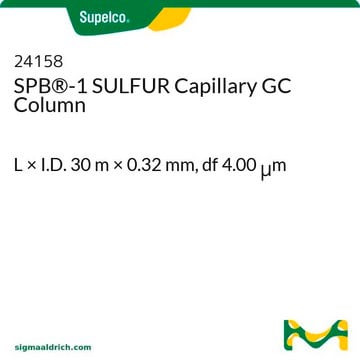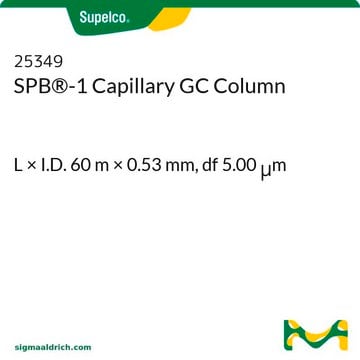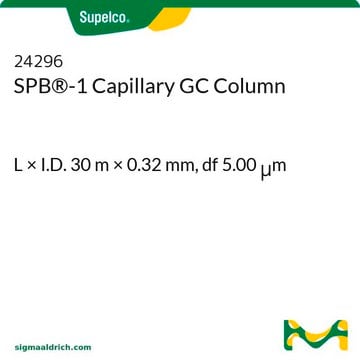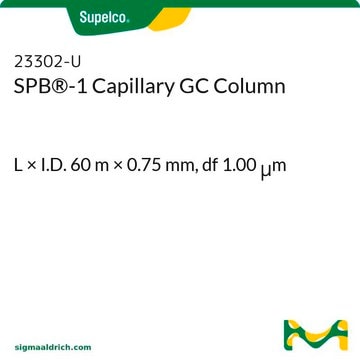24028
SPB®-1
L × I.D. 30 m × 0.25 mm, df 0.25 μm
Iniciar sesiónpara Ver la Fijación de precios por contrato y de la organización
About This Item
UNSPSC Code:
41115710
eCl@ss:
32119290
Productos recomendados
material
fused silica
agency
meets requirements for USP G1, G2, and G9
parameter
-60-320 °C temperature (isothermal or programmed)
Beta value
250
df
0.25 μm
technique(s)
gas chromatography (GC): suitable
L × I.D.
30 m × 0.25 mm
matrix active group
Bonded; poly(dimethyl siloxane) phase
column type
capillary non-polar
¿Está buscando productos similares? Visita Guía de comparación de productos
General description
Application: This column is often used for traditional general purpose applications, where a non-polar column is required. Analytes will be separated primarily according to boiling point.
USP Code: This column meets USP G1, G2, and G9 requirements.
Phase:
USP Code: This column meets USP G1, G2, and G9 requirements.
Phase:
- Bonded
- Poly(dimethyl siloxane)
- ≤0.32 mm I.D., <2 μm: -60 °C to 320 °C (isothermal or programmed)
- ≤0.32 mm I.D., ≥2 μm: -60 °C to 300 °C (isothermal or programmed)
- ≥0.53 mm I.D., <2 μm: -60 °C to 300 °C (isothermal) or 320 °C (programmed)
- ≥0.53 mm I.D., ≥2 μm: -60 °C to 260 °C (isothermal) or 280 °C (programmed)
Application
SPB®-1 Capillary GC Column was used for speciation of the nitrogen compounds (quantitatively), which are polar and somewhat basic in nature, with chemiluminescence detection.
Other Notes
We offer a variety of chromatography accessories including analytical syringes
Legal Information
SPB is a registered trademark of Merck KGaA, Darmstadt, Germany
Storage Class
10 - Combustible liquids
wgk_germany
WGK 1
flash_point_f
214.0 °F - closed cup
flash_point_c
101.1 °C - closed cup
Elija entre una de las versiones más recientes:
¿Ya tiene este producto?
Encuentre la documentación para los productos que ha comprado recientemente en la Biblioteca de documentos.
Los clientes también vieron
P J Streete et al.
The Analyst, 117(7), 1111-1127 (1992-07-01)
Headspace gas chromatography with split flame-ionization-electron-capture detection is a simple method of screening for a wide range of volatile substances in biological fluids. A 60 m x 0.53 mm i.d. thick-film (5 microns) fused-silica capillary coated with SPB-1 (Supelchem) with
A Paraneeiswaran et al.
Chemosphere, 95, 503-510 (2013-11-05)
In this study, a promising bioremediation approach was developed to remove [Co(III)-EDTA](-) complex that is generated during the waste management process. Though several studies have been reported on bioremediation of cobalt, the removal of [Co(III)-EDTA](-) complex has not been tested.
C B'Hymer
Journal of chromatographic science, 45(6), 293-297 (2007-07-14)
An automated static headspace gas chromatographic method for the determination of residual solvents in the bulk drug substance alpha-phenyl-1-(2-phenylethyl)-piperine methanol, a serotonin 5-HT2 receptor antagonist, is evaluated. The method includes the use of 1-propanol as an internal standard. The gas
C B'Hymer
Journal of chromatographic science, 46(5), 369-374 (2008-05-22)
A static headspace gas chromatographic method is developed and evaluated for the quantitation of residual 2-propanol, methanol, and toluene in bulk (2alpha, 6alpha, 8alpha, 9alpha beta)-octahydro-3-oxo-2,6-methanon-2H-quinolizin-8-yl-1H-indole-3-caboxylate methanesufonate hydrate, a serotonin 5-HT3 receptor antagonist drug compound. This method is accurate and
A M Roccamo et al.
The European journal of neuroscience, 11(5), 1615-1623 (1999-04-24)
The properties of the nicotinic acetylcholine receptor (AChR) are modulated by its lipid microenvironment. Studies of such modulation are hampered by the cell's homeostatic mechanisms that impede sustained modification of membrane lipid composition. We have devised a novel strategy to
Nuestro equipo de científicos tiene experiencia en todas las áreas de investigación: Ciencias de la vida, Ciencia de los materiales, Síntesis química, Cromatografía, Analítica y muchas otras.
Póngase en contacto con el Servicio técnico







